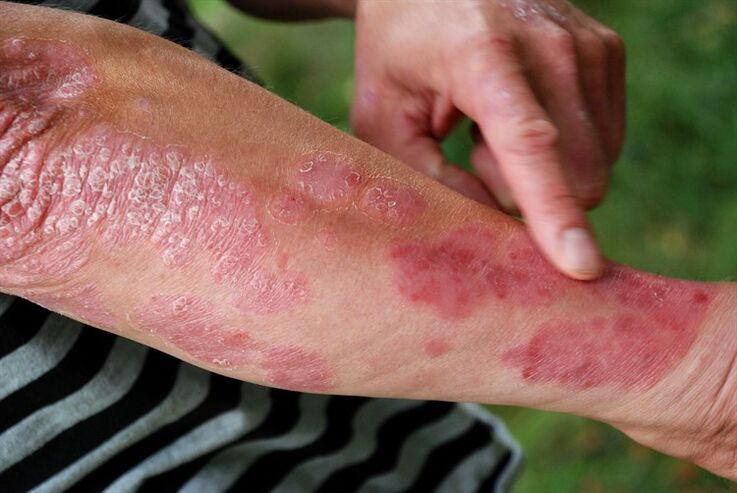Psoriasis is a common skin disease. Its name comes from the Greek word "psora" (translated as "itch"). Today, about 5% of the world's inhabitants suffer from the disease.
Psoriasis can occur in people of all ages, from infants to the elderly. Practice shows that most patients are young people. They go to the doctor with suspicion of psoriasis.
Before visiting the clinic, you need to know which specialist you need to contact to deal with such complaints.
Which doctor should I contact if I suspect psoriasis?

If the first signs of psoriasis appear, it is necessary to see a dermatologist. After all, the symptoms of the disease first appear on the skin.
A specialist in the qualified treatment of the skin disease will make the correct diagnosis and take all necessary treatment measures.
If the patient has a complex type of psoriasis (psoriatic arthropathy), it should be treated by a specialized rheumatologist.
No matter which specialist a patient turns to, a doctor can easily confirm or conversely disprove the presence of the disease.
Treatment of any form of psoriasis is a laborious process. By the way, in principle a complete cure does not occur. Even after symptoms go away, the disease goes into a remission phase. In this case, symptoms may disappear completely.
Which doctor treats psoriasis?
Psoriasis is a systemic disease whose symptoms are not limited to a rash. Often, its process is accompanied by changes in metabolism, immune disorders, and dysfunction of the endocrine system.

Violations often affect the work of internal organs. Therefore, in this case, it is not enough to consult a dermatologist.
Psoriatic plaques form on the scalp in many patients. In this case, the advice of an appropriate expert is also required.
Dermatologist
It is important to regularly monitor people with psoriasis by an experienced dermatologist. This is very important because the disease can even get worse for several years after remission.
In addition, specialists conduct necessary research to identify underlying diseases that may lead to the development of skin diseases.
In this case, it is necessary to treat it effectively.
All treatments, regardless of the severity of the disease, must be approved by a dermatologist. Sometimes psoriasis triggers a pathology that affects the joints - psoriatic arthropathy. If any complications arise, the specialist will refer the patient to a rheumatologist.
Specialist
When answering a common question about which specialist treats psoriasis, many people forget to eliminate not only the outward manifestations of the disease, but also the causes of deteriorating health. Therefore, in order to effectively treat this disease, the help of highly specialized experts is inseparable.

The following are doctors who treat psoriasis and its common complications:
- gastroenterologist: This doctor's help is required in case of severe organ damage. In such cases, strong medication is usually required. Despite their negative effects on the condition of the stomach, liver, work, the course of treatment with these drugs produces good results;
- cardiologist: Pathology may be accompanied by a significant disturbance of the work of the heart (pericarditis, myocarditis). In this case, the patient only needs professional help from a cardiologist;
- Nephrologist:Some forms of the disease are accompanied by severe failure, partial dysfunction of the bladder, kidneys. Treatment of such diseases should be carried out by a qualified physician;
- Neurologist:Neuropathology often causes recurrence of the skin disease. Therefore, patients who are prone to prostatitis (or when it recurs) should have preventive examinations every 3-6 months;
- rheumatologist: In case of arthropathy, consultation with a rheumatologist is necessary. It is impossible to get rid of this disease without the right choice of treatment principles.
Pathological treatment is only effective if action is taken in a timely manner. Following your doctor's advice will allow you to cope with mental discomfort and rule out the development of future complications.
It is recommended that all patients with psoriasis be observed by a psychologist. More than 78% of disease exacerbations are manifested by nervousness, severe stress.
An experienced psychologist will help each patient cope with emotional stress. Thanks to this, a better fit in society is possible.
Definite Diagnosis: What Physical Exams Do You Need?

During the initial diagnostic workup, if psoriasis is suspected, the patient must have the following mandatory tests during the initial workup:
- Urinalysis: necessary to determine the water-salt balance;
- Fecal Analysis:Need to detect possible worms in the body;
- blood test: In general, and biochemistry. Many patients mistakenly believe that blood helps to disprove or confirm a diagnosis. However, this is not entirely true. Such studies are done to identify possible complications caused by the disease. Blood can also allow you to determine if there is an allergic reaction in your body.
Other studies include:
- Bacterial culture: Perform when rash appears on mucous membranes. This is necessary to rule out pharyngitis (acute);
- radiography: If the patient has joint pain and the doctor suspects psoriatic arthritis, an auxiliary study of the bone structure;
- skin biopsy: To confirm the diagnosis, cytology of the epidermis, removed from the affected skin. Samples are taken from one or more areas of the body.
What does comprehensive medical support for patients include?
The ultimate goal of a doctor's work is to maintain a person's ability to work, as well as to prevent disability in patients with psoriasis.
Hospitalization is required if the patient has applied for qualified help in severe cases. In satisfactory cases, experts recommend pharmacy observation.
In this case, you need to see your doctor regularly. Thanks to this, it is possible to better control the dynamics of the disease.
Comprehensive medical support for people with psoriasis includes treatment in a special nursing home or pharmacy. It is not uncommon for patients to spend two weeks in specialized nursing homes.
In such medical institutions, patients are always under the supervision of experienced specialists. At the same time, not only the effectiveness of the treatment is controlled. Nursing homes also consider the most suitable menus for guests with psoriasis.
Many would agree that psoriasis is an unpleasant disease (both from a physical and moral point of view) for sufferers. Fortunately, medicine today knows many effective treatments for psoriasis.
Patients should be aware that there are many specialists available to help them today. Regardless of the extent of the disease, it must be properly managed. Positive outcomes and sustainable mitigation are only possible if the right approach is taken.























